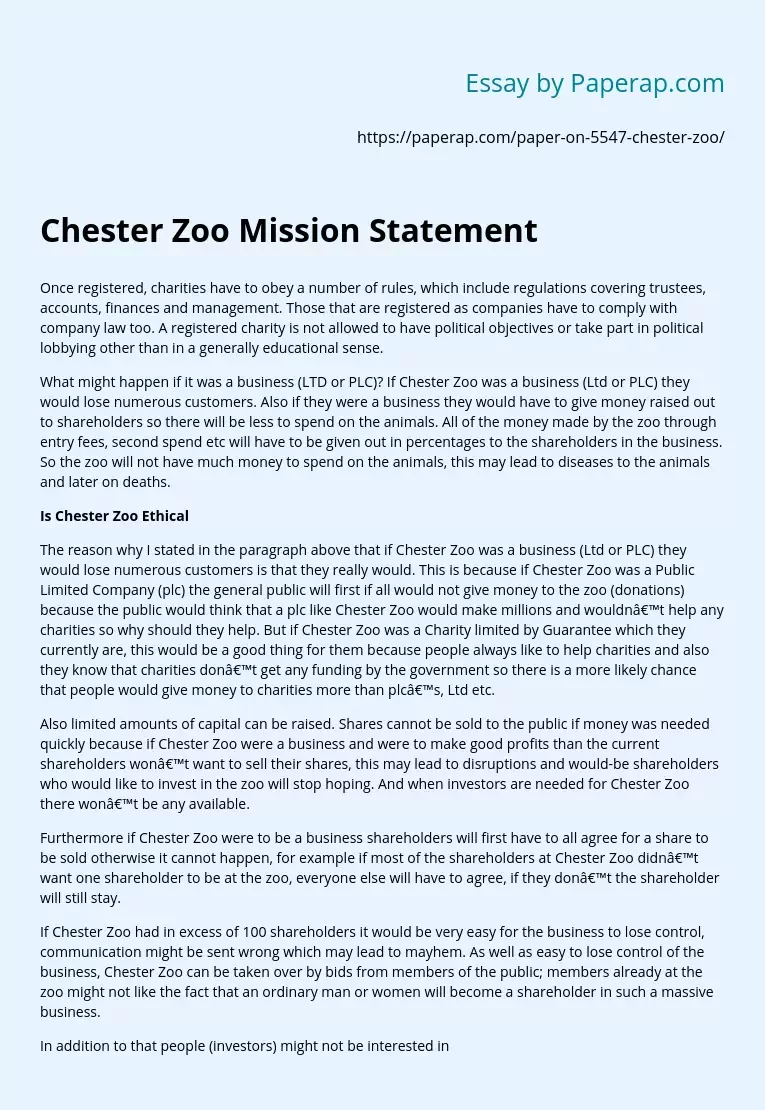Chester Zoo Mission Statement
Once registered, charities have to obey a number of rules, which include regulations covering trustees, accounts, finances and management. Those that are registered as companies have to comply with company law too. A registered charity is not allowed to have political objectives or take part in political lobbying other than in a generally educational sense.
What might happen if it was a business (LTD or PLC)? If Chester Zoo was a business (Ltd or PLC) they would lose numerous customers.
Also if they were a business they would have to give money raised out to shareholders so there will be less to spend on the animals. All of the money made by the zoo through entry fees, second spend etc will have to be given out in percentages to the shareholders in the business. So the zoo will not have much money to spend on the animals, this may lead to diseases to the animals and later on deaths.
Is Chester Zoo Ethical
The reason why I stated in the paragraph above that if Chester Zoo was a business (Ltd or PLC) they would lose numerous customers is that they really would.
This is because if Chester Zoo was a Public Limited Company (plc) the general public will first if all would not give money to the zoo (donations) because the public would think that a plc like Chester Zoo would make millions and wouldn’t help any charities so why should they help. But if Chester Zoo was a Charity limited by Guarantee which they currently are, this would be a good thing for them because people always like to help charities and also they know that charities don’t get any funding by the government so there is a more likely chance that people would give money to charities more than plc’s, Ltd etc.
Also limited amounts of capital can be raised. Shares cannot be sold to the public if money was needed quickly because if Chester Zoo were a business and were to make good profits than the current shareholders won’t want to sell their shares, this may lead to disruptions and would-be shareholders who would like to invest in the zoo will stop hoping. And when investors are needed for Chester Zoo there won’t be any available.
Furthermore if Chester Zoo were to be a business shareholders will first have to all agree for a share to be sold otherwise it cannot happen, for example if most of the shareholders at Chester Zoo didn’t want one shareholder to be at the zoo, everyone else will have to agree, if they don’t the shareholder will still stay.
If Chester Zoo had in excess of 100 shareholders it would be very easy for the business to lose control, communication might be sent wrong which may lead to mayhem. As well as easy to lose control of the business, Chester Zoo can be taken over by bids from members of the public; members already at the zoo might not like the fact that an ordinary man or women will become a shareholder in such a massive business.
In addition to that people (investors) might not be interested in buying shares as the zoo would be more interested in the welfare of the animals rather that the welfare of the shareholders. For example Chester Zoos Mission Statement is “The role of the Zoo is to support and promote conservation by breeding threatened species, by excellent animal welfare, high quality public service, recreation, education and science” This statement doesn’t say anything about the welfare of shareholders. This may prevent investors from investing into the business as they may assume that they are not part of the Chester Zoo family.
Chester Zoo Mission Statement. (2019, Dec 05). Retrieved from https://paperap.com/paper-on-5547-chester-zoo/

